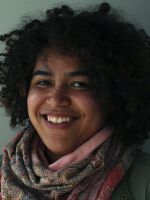We live here.
Those are the words that we found ourselves saying in the months after Michael Brown was fatally shot last August by then-police officer Darren Wilson.
Those are also the words we've chosen as the name for an effort we're beginning today. It’s a multi-faceted, multi-media project that we hope will shed some light on the very tangible racial issues that seemed to be at the heart of the unrest and protests that swept our region — and eventually the rest of the country — during the last few months of 2014.
The name seemed appropriate because variations of those words echoed throughout the questions people were asking.
It was a way of processing what was happening during a very fluid, and often confusing situation. We wondered why was this happening here, where we live?
When the national media swept in and attempted to explain the nuances of St. Louis, we felt more than a little miffed at how often they would confuse things, such as the difference between St. Louis County and the city of St. Louis. We knew because we live here.
For us, as journalists, the effort to merely cover events as they unfolded fogged our ability to clearly articulate what were the core issues that sparked the outrage. But as the protests slowly waned and the national eye started to pay attention to other news, we still lived here.
And we knew that there was really one big issue that explained so many aspects of the grievances that were expressed during the protests: Race.
As a newsroom, St. Louis Public Radio was very much aware that, even though the day-to-day news cycle isn’t all about #Ferguson anymore, the issue was far from settled, the story far from complete. We felt we were in a unique position to poke at the issues in a way that few other media outlets can do.
The questions are heavy. Why are African-Americans in our region disproportionately more likely than whites to be arrested and jailed? Why are blacks disproportionately less likely to experience good health, good schools, good jobs and safe neighborhoods? Why do racial disparities persist long after overtly discriminatory laws have changed? Why is it so hard to talk about race across racial lines?
We didn’t want to just tell another story about the inequalities that exist in our region. We wanted to tear into the issues, break apart the theory from the reality, demonstrate how the systemic problems that plague our region play out in real people’s lives. And we want to know why we still have these problems — no matter how much academic research and scholarly material there is available to explain the existence of racial inequality, why does it still exist?
And so, we came up with We Live Here.
It’s our attempt to dig in and find out why. And along the way, we want to share what we discover, as we discover it, with you. We want you to be part of the discussions — and not just by having you subscribe to our podcast and write comments online (although we would love if you do both of those things). We also plan to bring the conversation to where you live. We plan on having events, concerts, art shows, “confession walls,” … maybe even reading clubs and live broadcasts … all so you can chime in and help us sort through these complicated, uncomfortable topics.
We do ask that you pardon our dust along the way. Just as these issues aren’t easy to sort out, we’re still learning about the best way to reach into the topics and tell your stories in the best way possible.
In the meantime, you can expect a new podcast delivered to your favorite listening device every other Monday, starting next week, March 9.* We Live Here is edited by Shula Neuman and hosted by Tim Lloyd and Emanuele Berry. Theme music by Cassie Morgan.
Please do contact us with your feedback and ideas. And check back to this web page frequently as it continues to evolve with more stories and photos and video to help you appreciate that We Live Here.

*Editor's Note: The show no longer airs every Monday. Follow us on social media and subscribe to learn when new episodes are published.



